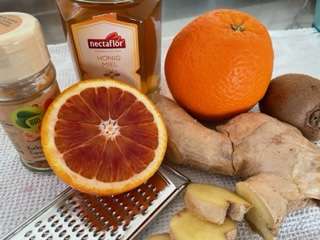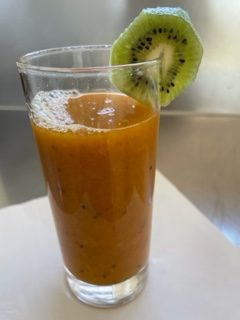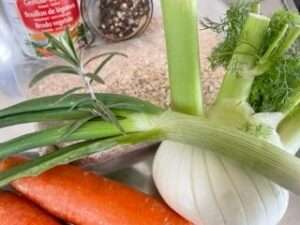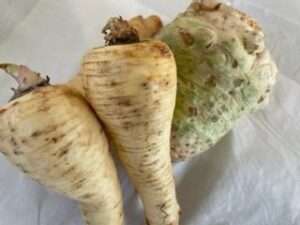The powerful, herbaceous plant can reach heights of up to 150 cm and looks visually similar to reeds. The main shoot under the ground, the rhizome (ginger rhizome), has been widespread and valued in the kitchen and natural medicine for thousands of years. The pharmaceutical name for the ginger rhizome is “Zingiberis rhizoma”. Aroma and healing power characterise the ginger tuber. The spicy, slightly earthy aroma makes ginger unique, and the tuber is one of the world's healthiest foods. The list of health-promoting properties is long. The powerful antioxidants and the anti-inflammatory, therapeutically effective ingredients (such as essential oils) should be noted. Not to be forgotten are the resin acids, neutral resin, and the substance gingerol.
Ginger has a stomach-friendly, digestive, circulatory and appetite-stimulating effect and contains iron, calcium, potassium, sodium, phosphorus and vitamin C.
Like no other root, ginger can suppress nausea (travel and seasickness).
The essential oils of the root have an antibacterial and antiviral effect, making it an effective remedy for flu-like infections. Ginger can counteract stomach irritation and gastritis by regulating the mucus layer and stomach acid. Depending on the origin of the ginger, differences in quality and composition or concentration of various ingredients must be considered.
Ginger originates from East Asia and is a traditional Chinese medicine (TCM) component. (antibacterial, antifungal, antitumoral, blood sugar-lowering, cholesterol-lowering, cold-relieving, muscle-strengthening, concentration-enhancing, liver-protecting, relieves menstrual cramps, muscle-strengthening, pain-relieving).

Stirnrunzler recommends ginger raw or cooked, as a spice, in tea and juices (combined with lemon or orange, mint and honey) and last but not least as “chewing gum”.
Ginger shot and ginger oat soup with fennel and carrots
Ginger shot

Ingredients:
- Acacia honey
- Fresh ginger
- Kiwi
- Turmeric powder
- Orange

Preparation
Wash, halve and squeeze the kiwi and oranges. Wash the ginger, peel and rinse again, grating finely. Add turmeric powder and one level tablespoon of acacia honey for one litre of juice. Mix everything well.


The winter and summer health drinks in the morning. If you have a sensitive stomach, eat a small portion beforehand to avoid acidity. Grate an apple and add it to the glass.

For intestinal and stomach problems, ginger-oat soup is recommended.
Ginger-oat soup with fennel and carrots
Ingredients for acute cases:
- Olive oil, possibly mixed with a bit of whisky.
- Oatmeal
- One tablespoon of vegan vegetable stock powder (Morga, for example)
- Seven dl water
- One piece of fresh ginger, grated if desired
- One small spring onion
- One large fennel
- Two carrots
- Rosemary
- Freshly ground mixed pepper
- Freeze-dried parsley and chives

Preparation:
- Wash, peel and chop the vegetables.
- Cover the bottom of the pan with olive oil and a little whisky.
- Finely chop the spring onion with some stalks and add.
- Mix in 2 – 3 tablespoons of oat flakes and sauté.
- Mix seven dl water with a piece of ginger (possibly grated) and vegetable stock powder.
- Bring to a boil.
- Add fennel, carrots, rosemary needles, turmeric powder, pepper, parsley, and chives.
- Simmer until the desired consistency (add some oat flakes and season).
Tip:
The oat soup can be enriched with parsnips, celery, and leeks if the stomach and intestines are healthy.

In addition to rosemary, a bit of caraway seeds helps with irritation of both intestines and stomach.
Sprinkle in before serving.

1 Response to "Ginger (Zingiber officinale) – ancient medicinal plant"
Is so amazing to see and value what nature can give us, I would never imagine ginger can be helpful for digestive problems, it is kind of spicy. very nice info!